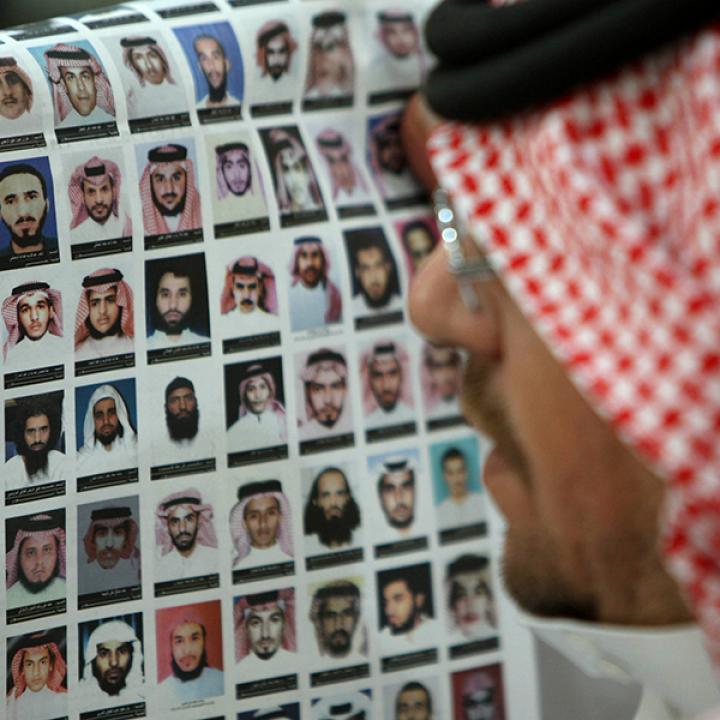
- Policy Analysis
- Interviews and Presentations
Wahhabism and Terrorism: Is Saudi Arabia the Arsonist or the Fireman?

At a forum held by the Washington-based Arabia Foundation, a noted Gulf expert discusses persistent questions surrounding the kingdom's role in supporting terrorism.
My short answer to today's question is that Saudi Arabia has been an arsonist and may still be. But we, meaning the United States and our allies, need to work with the kingdom so that it can also be a fireman. This is a work in progress.
But there is a longer answer. My specialism, when I am not writing about Qatar as I am this week, is to write about the Saudi royal family. I want today to quote from three pieces I have written which deal with the House of Saud's links to the terror attacks on the U.S. on 9/11.
On August 12, 2002, I wrote an op-ed for the Wall Street Journal titled "The Saudi Way." It was prompted by a Saudi announcement that the U.S. would not be allowed to use Saudi soil to launch an attack on Iraq. In the op-ed I referred to a January 9, 2002, story in U.S. News & World Report, titled "Princely Payments." In my piece I said the story provided a lead which few have followed up. I quote: "Two unidentified Clinton administration officials told the magazine that two senior Saudi princes had been paying off Osama bin Laden since a 1995 bombing in Riyadh, which killed five American military advisers. A Saudi official was quoted as saying, 'Where's the evidence? Nobody offers proof. There's no paper trail.'"
In the op-ed I continued: "I followed the lead and quickly found U.S. and British officials to tell me the names of the two senior princes. They were using Saudi official money -- not their own -- to pay off bin Laden to cause trouble elsewhere but not in the kingdom. That is 'the Saudi way.' The amounts involved were 'hundreds of millions of dollars,' and it continued after Sept. 11. I asked a British official recently whether the payments had stopped. He said he hoped they had, but was not sure."
It was another three years before I named the princes, and then only obliquely. They were, after all, still alive. In a further Wall Street Journal op-ed titled "Saudi Brezhnevs," dated August 3, 2005 (prompted by the death of King Fahd two days earlier), I wrote: "Washington makes little secret of not wanting either [Defense Minister] Sultan or [Interior Minister] Nayef to be king. Neither is considered modern enough; both are thought to have made past compromises with al Qaeda to redirect the threat to the kingdom onto U.S. interests."
I used this material when the famous or infamous missing 28 pages of the congressional 9/11 investigation were published in July 2016. In a piece for Foreign Policy, titled "What We Know About Saudi Arabia's Role in 9/11," I noted the words from page 436 when Treasury General Counsel David Aufhauser had testified that "offices of [the Saudi charity] al-Haramain have significant contacts with extremists, Islamic extremists." The previously secret paragraph went on to quote unnamed CIA officials as testifying that "the head of the central office of al-Haramain is complicit in supporting terrorism, and it also raised questions about Prince Nayef."
I concluded my article by saying that Saudi and even official U.S. claims of there being "no evidence to indicate the Saudi government as an institution or senior Saudi officials individually had supported the 9/11 attacks" left open the possibility, indeed the probability, that the actions of senior Saudis had resulted in the terrorist outrages. I went on: "I have never suggested that that the Saudi government or members of the royal family directly supported or financed the 9/11 attacks. But official Saudi money ended up in the pockets of the attackers, without a doubt." I continued: "I once asked a British official: 'How do we know?' He replied that we know what account the money came out of, and where it ended up."
Fast forward to the present. There is little doubt that Iran will blame Saudi Arabia for today's terrorist events in Tehran. Indeed, the Revolutionary Guard has already done so. Riyadh will surely, and angrily, deny complicity.
Here in the United States, despite the efforts of many to end the discussion, the debate about Saudi official involvement in 9/11 continues. For me, there are two main questions:
- How can Saudi Arabia make amends for its culpability in the attacks on that September day almost 16 years ago?
- How can we help or assist or insist that Saudi Arabia does even more to stop this terrorism which is so, so dangerous to the region and even the world's future?
Arabia Foundation



